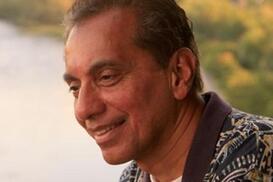|
Short Fiction ~ Cyril Dabydeen Honourable Mention, Strands International Flash Fiction Competition - 16 Her crinkly glare with her Russian-immigrant sensibility, I know, or not know. Winter a-coming, and being in Ottawa again--as she laments, “Now the only place where I want to be is at the bus station.” Her wry, but sardonic way, it seems. “And at the train station.” A pause. “The airport, also.” But why? Flashback: to St Petersburg, see. Not cold there, too? In Moscow also, where Lenin’s mausoleum is still intact, like falsifying time itself. “It all depends on what you’re looking for,” Vanessa counters. Now what am I looking for? Slender or willowy she is, here in her new city, or new country, but like her predestined place. And she hated the former Soviet Union, and the kitchen-life culture she’d lived. Clubs turned into meeting-places, soirees, with conspiracies everywhere. Samizdat: books secretly passed around. And her father’s a poet, let it be said for good measure. Her escape valve, and remembering more family members. Oh counter-revolution, like a new ploy. She tells me with style. Gypsy-like, you see. She’s indeed here, with time to practice a Flamenco dance routine. “It’s only in the past,” she says. What is? “Being an artist,” she mulls. “Not in the present?” I counter. “Back there in my growing up we did everything the Communists didn’t know about. We read poetry, but we were not revolutionaries, just iconoclasts. We did more than poets like Yevtushenko or Mayakovski, see.” Acknowledgement of secret days and nights. “You have to keep being an artist to survive,” she adds. “Then…but now?” Her going and coming: like who first went to the moon, and who or what was Sputnik? Who really was Yuri Gagarin, not make-believe. American Neil Armstrong walking tall, if ambling along on the moon’s surface. And poet Andrei Voznesenski had said that landing on the moon meant the death of the poet, words echoed by Canadian ambassador R.A.D. Ford who didn’t suffer fools easily I heard from his fellow diplomats. “It’s cold here,” Vanessa adds and heaves in. Does she mean just about the temperature? “I want to be only where it’s warm, and where the people are also warm, like in Barcelona.” To become a more authentic Flamenco dancer, maybe? Pause. “Spain, you must go there too,” she adds. A new place, like escape valve I conjecture. Now in Ottawa she can’t stand being confined in one place for long, not ever in winter. It’s like being in a wilderness. The Gulag, eh? She laughs, and I laugh with her. “Only as an artist you see it that way, yes?” She looks at me with almost jaundiced eyes. My own changing self it is, in our immigrant-beingness, ah. “As artists, we learn to survive.” “Maybe,” I say. Again the image: being at the bus stop, train station, the airport-- you see. Everything consequential. And always crossing borders. New refugees trekking or tromping along across Europe and now in the Ukraine. New political groupies, Nazis and neo-fascists, all in one fell swoop, it seems. Here now Vanessa no longer skates, nor skis, because . everything seems like an illusion. “Why do people ever want to be away from where they were born?” she asks. And see, she will keep doing her Flamenco dance routine to make her spirit strong. She will endure, being an exile. Who’s really an exile? Flashback: her father writing poetry in a small apartment in Moscow--children’s verse and contemplating days and nights together—if not like what Voznesenski wrote, but with striking imagery for children to know everything about their beginning before President Gorbachev. Yes, long before Putin. Not about Stalin? She takes more photographs with a bulky camera in her hand. Images: the aperture opening, shutters closed. She remembers things--ducks moving along with their retinue of ducklings. Fucklings! Red-winged blackbirds on a branch being skittish; they lean downward into the neck of the Rideau River. Winding spaces; and the river will soon be covered with snow. “I will find my own place at the train station, the bus station...the airport,” Vanessa repeats to me, like her familiar song. A gypsy’s farewell it sounds like. A long goodbye, somewhere. “Really?” Yes, at St. Petersburg where she’d attended university comes back to her, like verisimilitude. Her camera lenses become more focussed. Now being here where it’s so grey...in one lifetime, and even death seems like a curious journey she recently wrote in her journal. A bus moves off slowly not far away. The train’s locomotive noise next. An airplane drones high above, and another landing-place appears in sight. Everything with a lightness of being--even with a long winter ahead. And the waters below with the river meandering. She instinctively attempts another flamenco dance-move, moving one step at a time--enduring long. ~  Cyril Dabydeen’s books include My Undiscovered Country (Mosaic Press), God’s Spider (Peepal Tree Press, UK), My Multi-Ethnic Friends and Other Stories (Guernica Editions, Toronto), and the anthology Beyond Sangre Grande: Caribbean Writing Today (Mawenzi House, Toronto). Previous books include: Jogging in Havana (1992), Black Jesus and Other Stories (1996), My Brahmin Days (2000), North of the Equator (2001), and Play a Song Somebody: New/Selected Short Stories (2003). His novel, Drums of My Flesh, had been nominated for the 2007 IMPAC/Dublin Prize, and won the top Guyana Prize for fiction. Cyril’s work has appeared in numerous magazines and anthologies, e.g. Poetry (Chicago), Prairie Schooner, The Critical Quarterly, World Literature Today, The Warwick Review, Prism International, Canadian Literature, the Dalhousie Review, and in the Oxford, Penguin, and Heinemann Books of Poetry and Fiction. Former Poet Laureate of Ottawa (1984-87). Taught Creative Writing at the UofOttawa for many years
0 Comments
Leave a Reply. |
StrandsFiction~Poetry~Translations~Reviews~Interviews~Visual Arts Archives
April 2024
Categories |
 RSS Feed
RSS Feed